Today, I’m turning over the blog to The Florida Bar News where Senior Editor Jim Nash has written an expansive piece on the checkered past of Jake Lassiter just as he makes his final appearance in “Early Grave.”
I know what you’re thinking: Why is The Florida Bar publicizing a lawyer – fictional or not – who’s been flirting with disbarment for decades? A lawyer who’s said: “I’m not one of those lonely warriors of the courtroom, righting wrongs wherever I find them. I’m just an ex-jock wading through the muck of the so-called justice system. I don’t even mind getting dirty as long as the stains come out.” Read on to find out:
LAWYER-TURNED-WRITER PAUL LEVINE RETIRES HIS LINEBACKER-TURNED-ATTORNEY CHARACTER JAKE LASSITER
“I violated the number one rule: don’t give up your day job. But that’s what I did, I gave up a partnership in a national law firm to become a freelance writer.” – Paul Levine
By Jim Nash
The Florida Bar News
Jake Lassiter, the fictional Miami Dolphins linebacker turned two-fisted attorney, has committed his final caper.
Paying the price for too much helmet-to-helmet contact, Lassiter is diagnosed with CTE (chronic traumatic encephalopathy) and responds to a godson’s catastrophic injury by suing to halt football. That civil action turns Lassiter into “the most hated man in Miami.”
For veteran Florida Bar member turned best-selling author Paul Levine, letting Lassiter go after 33 years — “Early Grave” is the 15th and final book — was like shedding a part of himself.
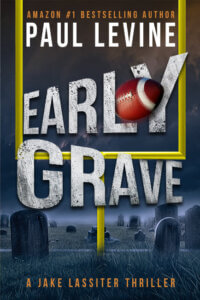
“To a certain extent, my protagonist is my alter ego, a sort of fanciful version of myself, somebody who is braver, and stronger, and who won’t take any bullshit,” Levine says. “So, yes, it’s hard to leave that behind.”
It reminds Levine of the sad day in 1998 when the Miami Herald folded “Tropic.” The Pulitzer Prize-winning Sunday magazine helped launch Levine’s career, and those of fellow authors Carl Hiaasen, Dave Barry, and Washington Post columnist Gene Weingarten.
Or the 2008 demolition of the Orange Bowl, the stadium that hosted the Dolphins’ 1972 undefeated season, an NFL record that no other team has matched.
Levine became part of it all in 1969, when he landed a reporting job with the Miami Herald fresh out of Penn State. When the National Enquirer poached the Herald’s court reporter, Levine took the beat.
Those were the days when Richard “Dick” Gerstein, a legendary South Florida pol, was state attorney and Circuit Judge Ellen “Maximum” Morphonios was presiding over the public exposure trial of Doors lead singer Jim Morrison.
For a 21-year-old cub reporter, it was heaven, Levine says.
“I had free reign through the state attorney’s office, and the public defender’s office, and I was just a kid,” he said.
Levine became interested in the law at Gerstein’s urging.
“Gerstein was always trying to plant favorable stories, which is fine, that’s what they do,” Levine said. “One day he said, ‘if you ever want to go to law school, I’ll give you a recommendation.’”
Levine took the bait. After graduating University of Miami Law School in 1973, he joined the Miami office of a Philadelphia-based firm, Morgan, Lewis & Bockius.
“It was a giant firm, where, when I became a partner, I didn’t know the names of a third of my fellow partners,” he said.
Levine was a civil litigator for 17 years, until he couldn’t do it anymore.
Inspired by lawyer turned author Scott Turow’s “Presumed Innocent,” and Hiaasen’s darkly comic “Tourist Season,” Levine was desperate to write full time.
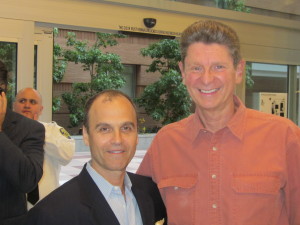
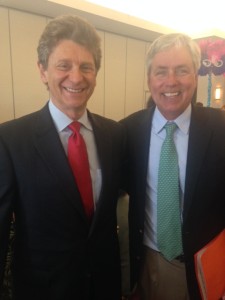
“I thought I would never write a book as long as I’m a partner in the law firm,” Levine said. “They gave me what they thought was a promotion, sending me around the country defending the asbestos industry, the world’s worst cases, and I was miserable.”
Levine finally told Philadelphia he wanted out.
“I did not do it the right way, I violated the number one rule, don’t give up your day job,” he said. “But that’s what I did, I gave up a partnership in a national law firm to become a freelance writer.”
Levine wrote his first book on “spec” while winding down his practice. To facilitate the change in careers, he was given free office space and a secretary by his law school buddy, famed Miami trial lawyer Stuart Grossman. “My own private grant from the Grossman Roth Endowment for the Arts,” Levine said, smiling. He figured that his existing cases could support him for a year, maybe two, if he was careful.
One year later, Levine mailed manuscripts to agents he found in a writer’s digest. One day the phone rang, and a stranger expressed interest.
“He said, I like this guy Lassiter, why don’t you make a mystery out of him?” Levine said. “I said, well, I thought I had. He said no, it’s not really a mystery, why don’t you try doing first person?”
Levine took the advice, even after learning that the caller wasn’t an agent, but an agent’s assistant.
“He represented me for my first three books,” Levine said. “When I wrote ‘To Speak to the Dead,’ he sent it out, and he had three offers in the first 48 hours.”
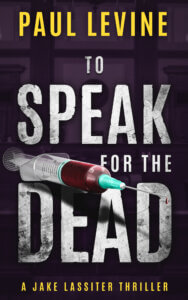
The first Lassiter book became an international best seller.
Lassiter is based on Levine’s legal experience and the real-life Nick Bouniconti, a former Miami Dolphins linebacker and leader of the “No Name” defense during the perfect season.
Before he came to Miami in 1969, Bouniconti earned a J.D. at night school while playing for the Boston Patriots. The parallels with Lassiter don’t end there.
In 1995, Bouniconti’s son, Marc, was rendered a quadriplegic while making a tackle for the Citadel. The senior Bouniconti raised millions for spinal cord research through the Miami Project to Cure Paralysis.
Nick Bouniconti died of pneumonia in 2019, while suffering serious neurological deficiencies. Before he died, he donated his brain to CTE research.
Lassiter, the fictional character, doesn’t believe the justice system always works, so he believes rough justice is better than no justice at all, Levine says.
But Lassiter has a code.
“Well, Lassiter says, ‘I won’t lie to a judge, bribe a cop, or sleep with my client,’” Levine says. “Other than that, anything goes.”
Lassiter uses his fists and bends the rules. At one point, he sneaks into a graveyard with a retired medical examiner and mentor, to conduct an unauthorized autopsy. In “Cheater’s Game,” Lassiter tackles the true-to-life college admissions scandal. Author Michael Connelly had this to say: “Clever, funny and seriously on point when it comes to the inequities of society and the justice system.”
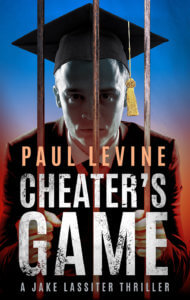
In another case, Lassiter agrees to investigate a lawyer whose incompetence financially devastates a client. Lassiter recruits a former teammate to serve as extra muscle, and instead of an office, orders the suspect lawyer to meet him in a dingy bar.
“Jake’s having a ‘hearing’ over Australian beers,” Levine quips. “He looks down at the lawyer’s watch, and says, ‘Is that a Piaget? Take it off!’”
Levine has won numerous writing awards, and his novels have been published in 23 languages. Another series, “Solomon vs. Lord,” remains active and has been optioned for TV, Levine says.
No stranger to screenwriting, Levine wrote 17 episodes of the hit CBS series, “JAG.” He later partnered with “JAG” creator Don Bellisario to co-produce another legal drama, “First Monday,” starring James Garner and Joe Mantegna. It lasted a single season.
“My TV mini-career wasn’t all that spectacular,” Levine quips.
Levine isn’t sure why he’s ending the Lassiter series, other than it feels right. Lassiter doesn’t age every year, like his creator, but he is getting up there, Levine says.
“I guess I just don’t want to repeat myself,” Levine says.
A 74-year-old Santa Barbara resident who hasn’t practiced law in decades, Levine is also unsure why he keeps his Florida Bar membership active.
“That’s a really good question,” he said. “Why do I still buy season football tickets for Penn State football?”
Levine acknowledges that he enjoys the CLEs because they help him keep his legal mystery writing current.
Legal training has come in handy while negotiating contracts, Levine said. And other than the “drudgery of preparation and research,” there are certain elements of practicing law that Levine misses.
“There are times when you’re in a firm, you sit down with two or three of your colleagues to try and solve a thorny legal problem, and you bounce ideas off another person,” he said. “If law is about solving problems, then yes, I miss that.”

